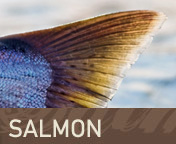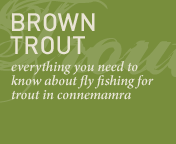

Plan Your Trip

A Packing List for Travel to Connemara.
What To Bring With You:
You probably won't have to buy anything new while preparing for a fly-fishing trip to Ireland, but the 50 lb. limit on checked baggage – and the new 22 lb. limit on carry-on bags – makes careful planning and selection of clothing and fishing gear a high priority.
Outerwear:
Ireland is called the Emerald Isle for a very good reason: it rains a lot. But unlike the soaking rains and violent thunderstorms that can often ruin a fly-fishing trip in the U.S. or Canada, the rain in Ireland usually improves the fishing. Rain will raise the river levels (when they're called "in spate"), bring in fresh salmon and sea trout, and stir up the resident fish. Because most of the loughs and rivers in Connemara are fed by rainwater that filters through the many square miles of peat, even a driving, hard rain will rarely discolor the water. And while it rains pretty relentlessly during the winter, the rains of late spring and summer are more often brisk showers that are short-lived and more refreshing than an annoyance. But, saying that, it pays to come prepared:
The weather in Connemara can change quickly from sunny and mild to wet, cold and windy – even in mid-summer. So bring lots of layers – or buy a thick Aran sweater in Clifden and look just like Liam Clancy! And, don't forget a really good quality waterproof/breathable rain jacket – or your favorite waxed-cotton coat – plus rain pants if you plan to do any fishing from a boat.
While fleece, down and other synthetics will keep you warm in the chilliest weather, most of the Irish people you'll encounter rely on wool. Wool is the only fiber that retains its insulating properties when wet – and wet is part of life in Ireland, especially in the west where it can rain frequently.
And, bring a hat – or two – because it will keep the rain out of your eyes and help you stay warm. This is the perfect opportunity to wear that tweed fishing hat you've been so reluctant to wear when fishing at home. Or, buy one in Clifden when you arrive in Connemara.
Clothing:
The Irish wear comfortable, casual clothes for the most part, although older men and women are more formal, wearing tweed coats and neckties and long dresses and sweaters, whenever they go to town.
For daytime fishing, we always pack several lightweight wool or cotton flannel shirts, comfortable trousers, denim jeans or fleece wader pants, and lightweight long underwear made of silk or merino wool. If your hands get cold, especially when wet, bring a pair of fingerless gloves, too.
In the evenings you'll always be welcomed in the better restaurants if you wear "business casual" attire. A few of the more elegant castles and country house might be a bit more formal, so it pays to ask about their dress code when you book your accommodations. Torn or ragged jeans, sleeveless t-shirts, tank tops, and short-shorts are, thankfully, not welcome anywhere.
Finally, you may discover that the bathroom (called a "toilet") in your B&B or hotel is a few doors away from your room, a situation that gives many Americans fits. So bring a lightweight bathrobe or nightshirt for midnight sprints down the hall, and you'll never pay extra for an "ensuite" bathroom again.
Footwear:
For walking around after hours, you'll be most comfortable wearing waterproof/breathable shoes or low-cut hiking boots with wool socks. When fishing, wear your favorite waders or a pair of knee-high rubber boots (See "Gear and Equipment" section under How to Fly Fish In Connemara)
Fly Fishing Tackle & Equipment:
See "Gear and Equipment" section under How to Fly Fish In Connemara.
Smart Things To Bring:
Photocopies:
Make photocopies of your passport and stow them in pockets in both your checked and carry-on baggage. Then, should you lose your original, it will be relatively painless to obtain a replacement at the U.S. or Canadian Embassies in Dublin. While you're at it, make photocopies of your medical or eyeglasses prescriptions, any cash or credit cards you'll take with you, your airline, hotel and rental car reservation confirmations, and your driver's license.
Telephone Numbers:
We always carry a printed list of names, addresses and telephone members of everywhere we plan to stay, restaurants and pubs we want to visit, fishing guides, our rental car company, our credit card company, our bank and the U.S. Embassy.
Destination Luggage Tags:
We make simple, laminated luggage tags with the address and phone number of the first B&B or fishing lodge on our travel itinerary to make it that much easier for the airline to forward anything they might lose in transit.
Compact Binoculars:
Once you start carrying high-quality, compact binoculars, you'll never leave home without them. They're indispensible for sightseeing, observing wildlife, and identifying what kind of mayfly the trout are eating out in the middle of the river.
Bug Repellant:
While we've yet to see a mosquito in Connemara, biting midges (a close cousin of our No-See-Um) can be a problem at dusk and dawn – or whenever the wind dies down. We always carry a small bottle of DEET – or Picaridin-based insect repellant (sealed inside a zip-like bag for air travel!), for those few but memorable occasions when the midges go on the feed. Most of the local Irish guides recommend Avon's "Skin So Soft".
Hidden Pocket:
We carry our passports, cash and extra credit cards in a small, lightweight "hidden pocket", often called a hidden travel wallet. These are thin, rectangular pouches sewn from silk or other light fabric with one or two compartments accessed by zippered openings. A pair of belt loops allow you to hang the "pocket" inside your pants where it cannot be seen or "picked" by bad guys. These are much more comfortable and convenient to use than larger money belts.
Electrical Adapters:
Irish electrical outlets are different than those in North America, so require a simple adapter to accommodate our two-pronged plugs. Some hotels provide them, others do not, so bring a couple with you to recharge your computer, cellphone and other electronic devices.
Travel Alarm Clock:
Because there may not be an alarm clock in your hotel or B&B room – a compact travel alarm is almost a necessity.
Extra Batteries:
Assume you will not be able to find replacement batteries for any of the battery-powered devices you bring with you. If, you do, they'll be very expensive, so bring plenty of spares.




